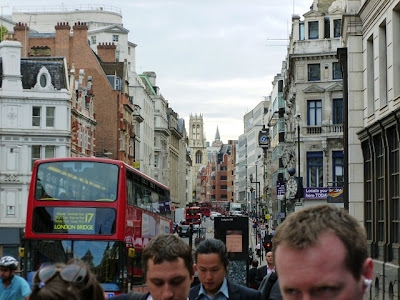“There was a great hurry in the streets, of people speeding away to get shelter before the storm broke; the wonderful corner for echoes resounded with the echoes of footsteps coming and going, yet not a footstep was there. ‘A multitude of people, and yet a solitude!’ said Darney, when they had listened for a while.”
--Charles Dickens, A Tale of Two Cities
“I think I know why Americans got so fat,” Husband said as we nudged our way through the crowd on Oxford Street. I walked in front of him with my head tilted back as if admiring the gothic architecture. Really, I was trying to breathe air not tainted by the cigarette smoke wafting around us.
“Why’s that?” I asked.
“We all quit smoking,” he coughed.
Today we planned to spend exploring the city, perhaps taking in a museum or two. We started in Trafalgar Square, watching kids grab bronze handfuls of the famous lion’s mane to pull themselves up and perch on his back for a picture. I loved cities; I love the movement toward entropy, the collective decision-making (we shall all cross this street against the light—now), the blur of faces like a pointillist mural, and the sudden shock of singling out one point, one face, to focus on and absorb. I also like recognizable smell of big cities—New York, San Francisco, Chicago, Madrid—and now, I confirmed, London as well. Stale beer, hot pavement, warm fruit, and a fluttering of various perfume notes with each passing woman.
In Trafalgar Square, we got sucked into a busker’s act. A young man with a concave chest and curly, long, brown hair hollered at passers-by who wondered into his “performance space,” a rectangle pressed against one wall of the National Gallery and bordered by 20 foot lengths of metal chains. “Clap! Scream for me!” He directed the baffled crowd. He called for volunteers, and no one answered. Finally, Husband stepped up with an air of “do I have to come over here and do everything for this country?” The kid’s name was Aj—our son’s nickname. I believe that may have been the factor in Husband’s decision to step forward and subject himself to ten minutes of routine/predictable/overwrought street performer jokes and tricks. He and a guy named Paul from Belfast wrapped Aj up in the chains, and Aj pretended to struggle against them for a few minutes before “breaking free” with all the conviction of a bored circus ape. One little boy yelled out above the noise of the city, and Aj asked him where he was from. “Scotland!” shouted the kid. “No wonder,” said Aj. Tourists on the balcony of the National Gallery emerged from walking through the halls of Picassos and Vermeers, blinking in the bright sunlight. “Hey! You up there! Look at me!” Aj shrieked at them. Husband’s performance over, we picked up lunch and then made our way down Charring Cross to the Millennium Bridge.
At the Southbank Centre on the south side of the city (Shakespeare’s side, the Globe’s side), we confronted the deep hazel eyes of an urban fox. The massive straw fox sat on the top of the Royal Festival Hall with his head slightly bowed as if apologizing for showing up unexpectedly. Whereas the north side of London seemed all befuddled tourists and needy buskers on a Friday afternoon in July, the south side seemed thrilled with warm sun, blue sky, sunglasses to shade the shards of light reflecting off the Thames, and public art. Passing under the straw bits at the end of the giant fox’s tail, we found a row of tiny beach houses, each with different themes on the history and culture of London’s shores, lining the embankment walkway. Above the beach house walkway, an installment on the poetry of children seeking asylum in the UK rattled and whipped like seagulls’ wings. The young poets’ words had been printed on large sheets of white canvas and woven into metal tension wires in the shape of a boat, and the entire display sang and fluttered in the breeze off the river.
We heard the low hum of skateboarders’ wheels. Teenage boys popped and tricked, their crashes echoing through the concrete bunker, while younger kids sat around the top edge and pretended not to notice. One little girl in a purple skirt puttered along on her scooter, singing to herself, as the teens whizzed around her.
A horrible, out-of-tune, out-of-date guitar player with nothing important to say, except that he planned to say it loud, and continuously, set up his stand and hat along the Embankment and howled his deepest darkest fears about humanity. “Aw, go on then, shut up whydontcha,” someone shouted back.
I felt like it might be time to eat again. I found Husband near the river, watching an old guy with a long bamboo pole and a spark plug as a weight on his line. He asked the fisherman what he liked from the Thames. “Oh, evertin,” said the red faced man with a bouncing Cockney lilt. He allowed as how he mostly caught eels, some bootlaces, but some good sized for eating. He sat down his tall can of Guinness to pull a worn photo out of a waterproof case. It showed him standing in the same spot, holding up a shiny black tube. “That’s me biggest,” he said. We made the universal noises of admiration. “Yea,” he said, “do this all day, go home and feed me cat, then go to the pub.” We watched him cast again, the line like a spider’s filament reaching for the opposite bank. “Not a bad life,” he sighed.




